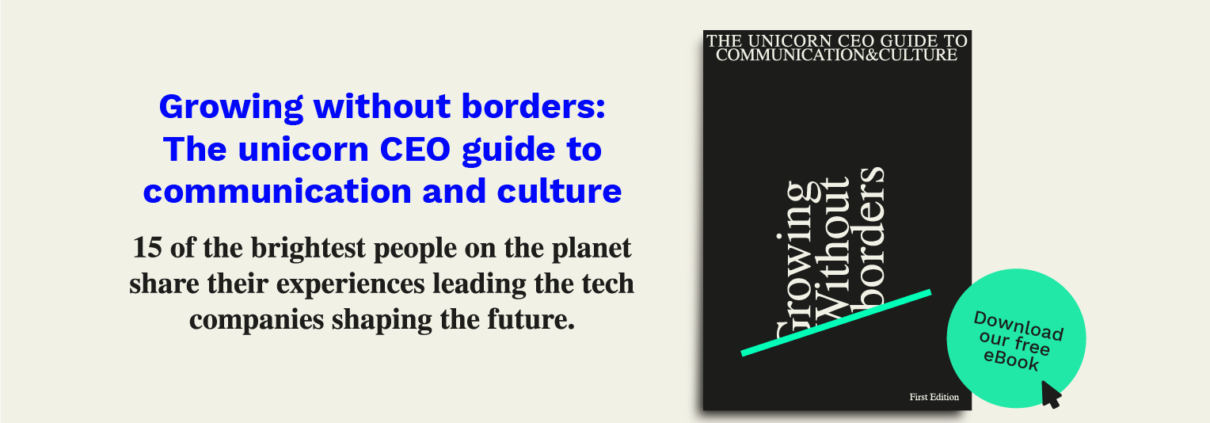Launching ‘Growing without borders: The unicorn CEO guide to communication and culture’
In late 2019, we began a series of ‘Without Borders’ podcast interviews with tech entrepreneurs at a critical stage in their careers. They had each achieved ‘unicorn’ status, having created a privately-held start-up company valued at over US$1 billion.
We wanted to know what they had learned about communications on their journey; the hard lessons and experiences that they will never forget. Why? Because although Silicon Valley and other tech hubs, from Cambridge to Tel Aviv, are ecosystems, there is a gap in those systems. While technology entrepreneurs are nurtured through all kinds of knowledge-sharing and funding within the ecosystem, in my 20+ years of working with the technology industry as a communications consultant it has become increasingly clear that it offers precious little in terms of nurturing communications skills. And this, at a time when stakeholder expectations of transparency and a ready-made public persona are higher than ever.
Plugging a gap in the technology ecosystem
Our aim with the podcasts has been to build a community that shares the communications skills required for this specific group of technology leaders; to plug the knowledge gap. It was a good fit with our guiding principle at Tyto PR, which is to be the perfect partner to our clients and the technology ecosystem.
More than a year on, and the first podcast series of interviews with unicorn leaders (the second continues to be recorded and broadcast) has become an eBook. We recognise that not everyone has the time to listen to podcasts, so we have distilled the most valuable, actionable insights and bottled them in a more convenient form. You can download our free eBook ‘Growing without borders: The unicorn CEO guide to communication and culture’ here.
The ‘cast’ in this series have shared lived experiences and knowledge. They include insights such as Darktrace Co-CEO Poppy Gustaffson’s discovery of analogies as a powerful tool for explaining technical information to non-technical audiences – so powerful that the company has extended this approach to naming some of its core products this way.
I could also mention Adrien Nussenbaum, Co-Founder of Mirakl, whose experience of founding a company in France but that now has more employees in the USA has gained him a unique understanding of how to manage cultural differences in a fast-growing workforce.
Here also, Martina King, CEO of Featurespace, shares how an external change of perception of the company, when it transitioned from “underdog start-up” to major success, affected how the company communicated.
These are just a few among the many insights shared by our ‘cast’ of entrepreneurs that includes:
- Chen Amit (Co-Founder & CEO, Tipalti)
- Mario Ciabarra (Founder & CEO, Quantum Metric)
- Poppy Gustafsson (Co- CEO, Darktrace)
- Greg Jackson (Founder & CEO, Octopus Energy)
- Martina King (CEO, Featurespace)
- Mike Massaro (CEO, Flywire)
- Charles McManus (CEO, ClearBank)
- Adrien Nussenbaum (Co-Founder, Mirakl)
- Avinash Rugoobur (President & Chief Strategy Officer, Arrival)
- Arik Shtilman (CEO, Rapyd)
- Dr Tim Sievers (CEO, Deposit Solutions)
- Sir Martin Sorrell (Chairman, S4Capital)
- Vijay Tella (Founder & CEO, Workato)
- Felix Van De Maele (Founder & CEO, Collibra)
- Clay Wilkes (CEO, Galileo)
So a final note. CEOs of unicorn companies are some of the brightest people on the planet. The majority come from an engineering background and while some take to communications naturally, many do not. The insights and experiences captured in this book, I believe, can help technology leaders become wiser, even more articulate communicators. Once gained and added to their already extraordinary skillsets, communications skills will only help their businesses, and their careers, thrive.
Brendon Craigie
Founder and CEO, Tyto PR




